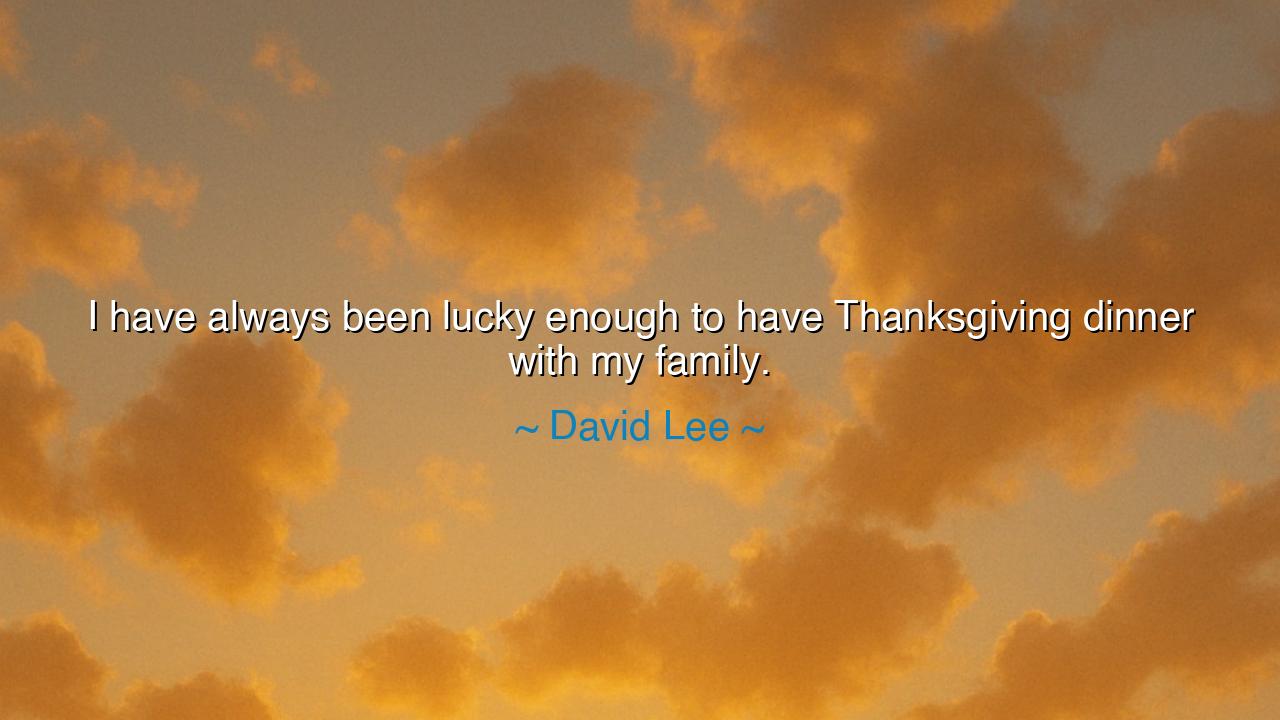
I have always been lucky enough to have Thanksgiving dinner with






David Lee, in words simple yet profound, once declared: “I have always been lucky enough to have Thanksgiving dinner with my family.” Though spoken with humility, this saying carries the weight of gratitude and the sacred recognition of what many take for granted. In those few words, he reveals that the true wealth of life is not in fame, nor possessions, nor triumphs, but in the enduring gift of gathering at a shared table, surrounded by those who anchor the heart.
The essence of his teaching lies in the acknowledgment of blessing. To sit at a table each year with loved ones, to share food and fellowship, is no small fortune—it is a gift denied to countless souls separated by war, distance, or hardship. What Lee calls “luck” is in truth the fruit of bonds, of family ties preserved, of traditions passed down without interruption. His gratitude transforms the ordinary act of a holiday meal into something sacred, reminding us that family presence is itself a treasure.
History echoes this truth. Consider the pilgrims and the first Thanksgiving of 1621, when survivors of great suffering joined with their Wampanoag neighbors to celebrate not abundance, but survival and kinship. For them, the table was not just about food but about being alive together, bound by gratitude. Centuries later, this spirit lives on: the meal is more than a feast; it is a declaration of unity. David Lee’s words tie him to this lineage of thanksgiving, where every dish is flavored with remembrance and every gathering becomes a monument of survival and love.
The statement also holds a gentle reminder about continuity. Year after year, returning to the same table with the same faces creates a rhythm of belonging. Children grow, elders age, and yet the act of gathering remains, weaving generations together into one living tapestry. When Lee says he has “always” been lucky, he affirms the power of traditions that endure, traditions that make the heart strong and the soul resilient. This is the hidden strength of Thanksgiving: it teaches us that even as the world shifts, some bonds are constant.
Yet in his words there is also an unspoken recognition of fragility. Not every family is whole. Not every seat at the table is filled. The luck he describes should stir in us not only gratitude but compassion, for there are many who long for such gatherings but face absence or division instead. Thus, his statement is not only a celebration but a call to remember those who cannot share in the same joy, and to extend the table of fellowship beyond the walls of our own homes.
The lesson is this: do not measure your life by achievements the world can see, but by the bonds that hold your heart. If you are blessed to sit with family, to share a meal, to give thanks together, count it as one of life’s greatest treasures. Protect it, nurture it, and never take it lightly. And if your family table is broken or incomplete, seek to build bonds of fellowship with neighbors, friends, or communities, so that the spirit of Thanksgiving endures still.
Therefore, let David Lee’s words stand as a reminder carved into the scroll of time: the family table is sacred ground. To share it is to taste more than food—it is to taste belonging, continuity, and love. Guard this blessing, and when you sit down at your own table, let your heart rise in gratitude not only for the meal but for the presence of those who share it with you. For this is the true feast, the true wealth, and the true joy that endures when all else fades.






AAdministratorAdministrator
Welcome, honored guests. Please leave a comment, we will respond soon